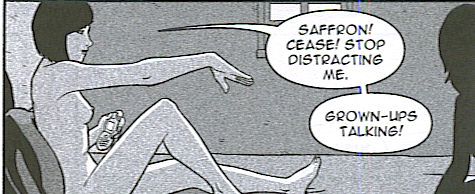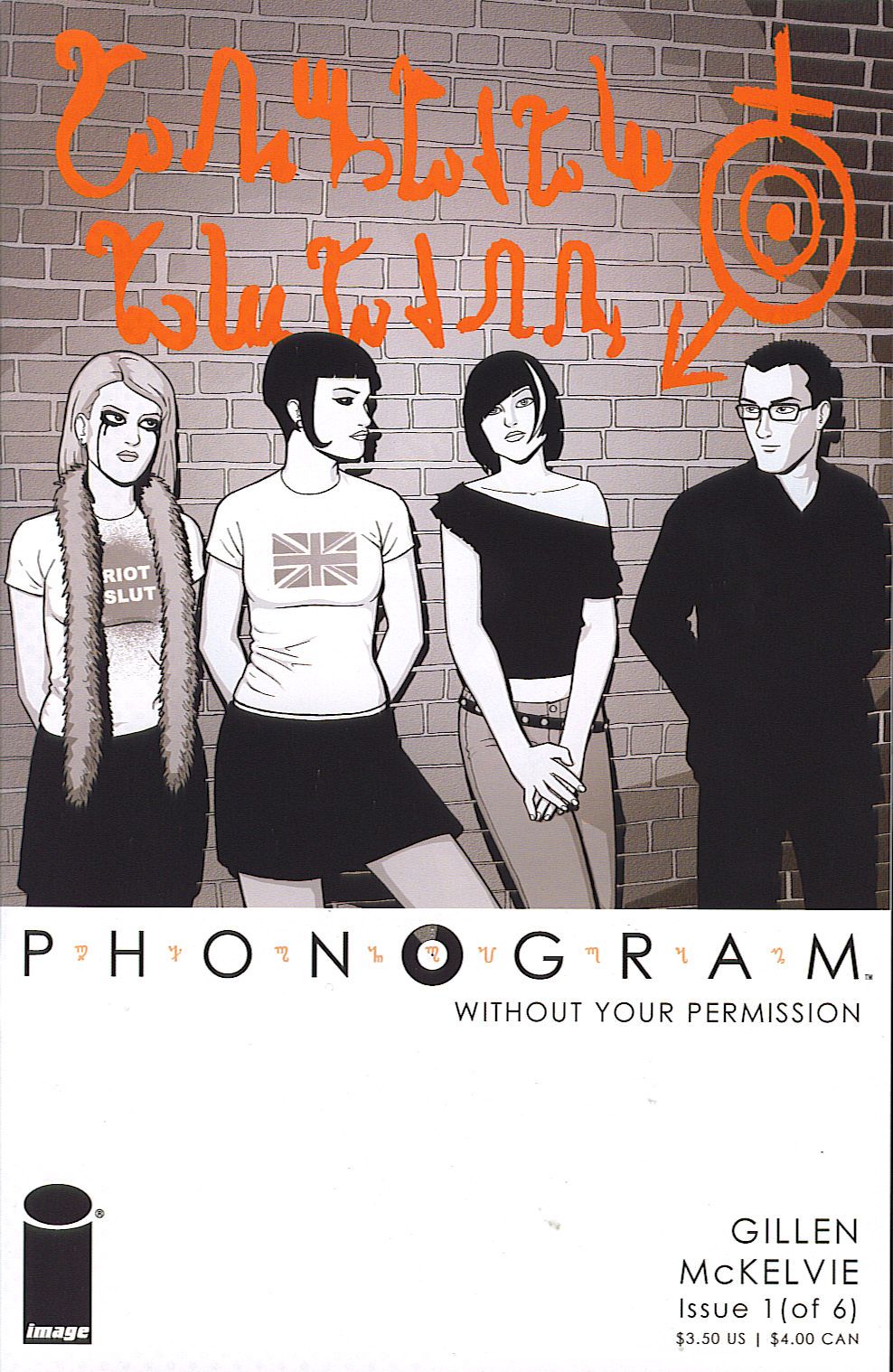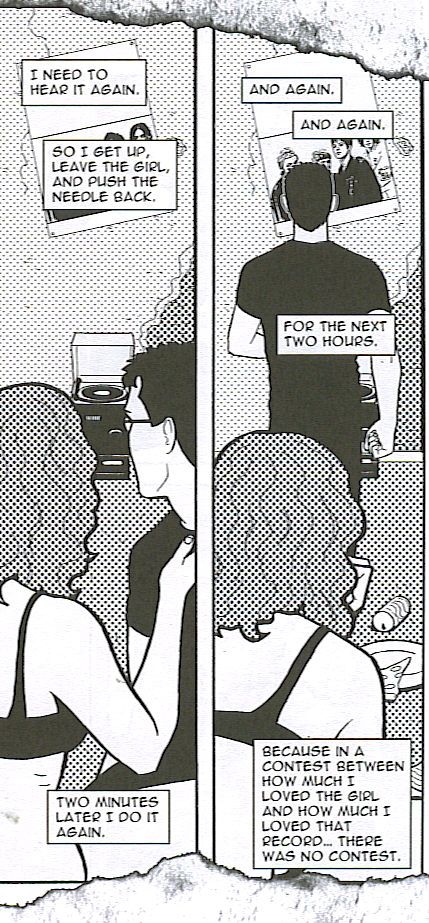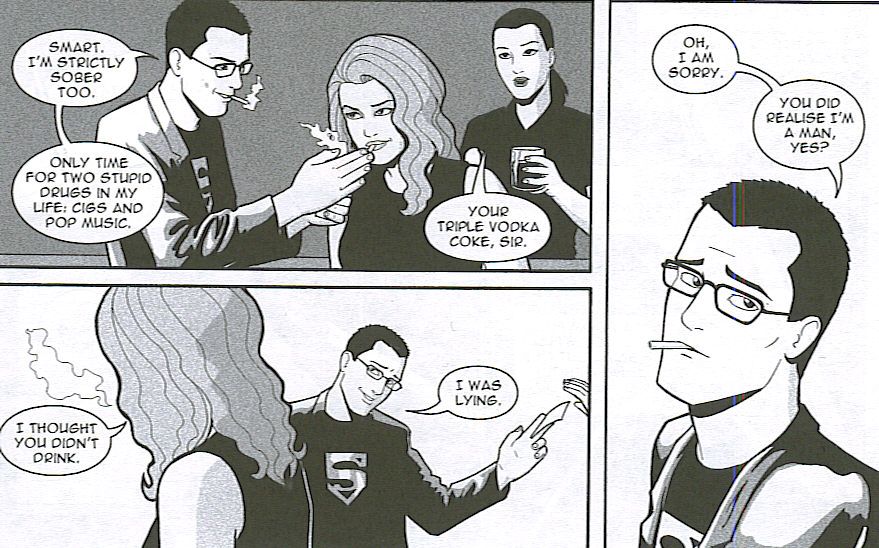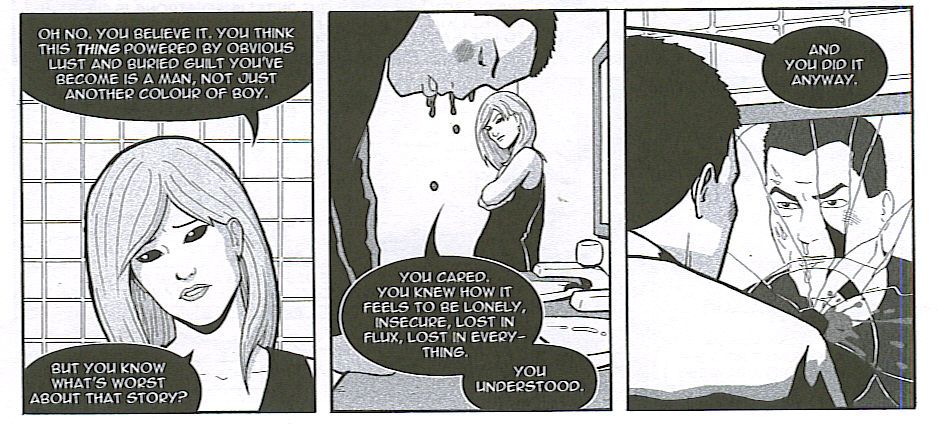I decided to try my hand at interviewing comic book creators, because I noticed a few of them dropping by the site. So I figured that everyone likes publicity, so why not ask them questions about their work? Kieron Gillen, writer of Phonogram, is my very first victim! So read on, and please forgive my poorly-thought-out questions. I never said I was Mike Wallace!
1. Tell the people, in your own words, what Phonogram is all about!
Phonogram is about how awesomely McKelvie can draw punk girls.
Er ... rewind.
Music is Magic.
I mean, it is. There's no reason why sounds arranged in sequence create an emotional response in us, let alone act as the catalyst for major life changes. We take that completely literally. That every change music makes in the world is a magical act. Our stories follow people who are aware of this fact, and use this knowledge to warp the world more to their liking. Most of our stories involve situations where two different sets of these so-called phonomancers have conflicting desires.
Or, if I were trying to sell you its movie rights, Hellblazer meets High Fidelity.
2. What other comics work have you done?
Phonogram's my first real work - by that I mean "Has my name on the cover." I've done a mass of small press and webcomic stuff previously. On the small press side, my most notable work's the Commercial Suicide anthology I co-edited with the beautiful and talented Alex "Smoke" De "Kat and Mouse" Campi. On the webcomics side, I'd point you at my in-progress modern-fantasy OGN Busted Wonder (here's the site), on which I'm collaborating with the equally beautiful and talented Charity Larrison. In terms of stuff for a small pile of cash, there's bits and pieces. McKelvie and I have been doing Save Point, the monthly editorial strip for the UK's Official Playstation Magazine, for three years or so. I sold a couple of strips to Warhammer Monthly before they decided to stop existing. Also trees across Europe hate me for the 280,000 copies that were printed of a comic I wrote as part of the marketing of a French videogame, but I don't like to talk about that. At least sober. Come back later.
3. How did you hook up with Jamie McKelvie? And how did you hook up with Image to get the book published?
Phenomenal luck, in the first part. He wanders over when I'm selling some small press stuff at a Bristol Con. I say that his style would be perfect for a book I'm writing. Later, he reads a script and agrees. In the words of Art Brut: Look at us! We formed a band! In the second part, while we were preparing the pitch McKelvie did a OGN with Eric Stephenson for Image called Long Hot Summer. Phonogram came up in conversation at San Diego, and they said they'd like to see the pitch. We gave 'em it. They liked it. Easy! I expect to pay the karmic debt eventually.
4. Music is obviously important in the book. Why did you decide on the "pop music" but instead of music that's a bit more, I don't know, hefty? What is it about "disposable" pop music that makes it perfect for the book?
I'm not exactly sure what you mean by "hefty": like something more classical? Or more primal like bits of world music? Or ... well, I'll go with "Why Pop Music?"
Because Pop Music changes peoples' lives - for better, for worse - every single day. From the woman who listens to the radio on the way to work and a song gives her the one smile of the day, to the man biting back tears at a wedding when the DJ plays some cheesy track connected to some sad event years in the past which he'll never correct to the lonely girl in her bedroom pressing play on a mixtape which contains information and ideas which will change the way she thinks, dresses and who she associates with for the rest of her life ... Pop Music does all that.
Every single day.
5. I thought the sex scene was a bit fun, but it felt a tad gratuitous. Why specifically did you put it in? Just to scare off the kids' moms?
Well, nowt wrong with scaring the moms.
I had a handful of reasons for the scene. A couple which explain why we'd want to have something a little bit more extreme in the first issue: firstly, Phonogram's a book which - sooner or later - is going to have that sort of thing. We needed something in the first issue to signpost this so people can't be surprised when it eventually does turn up. Secondly, it's the introduction to Emily Aster. Almost any time we meet Emily we'll find her involved in some decadent glorious adventure (in contrast to Indie Dave - who we'll meet eventually - who lives in a shack in Yorkshire with only rotting vinyl for company). We need to know from the first second what sort of person Emily is. That is, someone who enjoys casual sex, is callous enough to stop it answer the phone and then slag off her partner down it.
But neither of those really justify why we went for a lesbian sex act, do they? It's mainly a thematic point. Without the scene, we've got a straight axis between the bastardly and manipulative (male) Kohl and the puritanical and pure (female) Goddess/Ladyfest crowd. I don't like or believe in essentialist positions like that, so had to try and avoid it (which is tricky when you've got the Feminine Principle turning up as character). Equally, the other nods towards lesbianism are pretty much solely towards the idea of it being very right on, dour and political - which is cliched bollocks too. By showing Emily acting like she does we undermine both of those essentialist positions. There's other ideas of what being female (or into-girls) means in our world (and the world), and some are arguably as hedonistic and cruel as Kohl's. By showing some extremes, people can assume a middle ground. In other words, the scene's about showing the world is more complicated and to warn people against drawing easy lines.
Also, I thought it was pretty funny.
6. I have a feeling the music angle might be a bit off-putting to people who don't know it. It's not really necessary to know every reference in the first issue to enjoy the book, but there are a lot of them. How intricate are the references going to be as we get further into the story?
I think we actually loosen up a little for the rest of the series. There are references, sure, but once they're introduced we play with them for longer than they do in the (basically) self contained first issue. For example, in the second issue we'll introduce you to the concept of Manic Street Preachers, but once you've grasped what they "meant," you'll be able to understand their importance until the last issue. Even with that, the glossary in the second issue is slighter. I even padded it a little with some stuff I just wanted to talk about.
The only exception would be issue 4, which is probably the most reference heavy issue ... but it's also the most fantastical one. That the references can be taken on face value - i.e. what they do - I'm hoping it'll get in the way less than Kohl just namechecking some obscure record by the Slits.
In other words, I dunno. I hope not.
7. Do you expect this to be more of a "British" book, in that people on that side of the pond will "get it" more than we ignorant Yanks?
Maybe, but it could easily go the other way. People who lived through Britpop and are unable of seeing past the bits where our interpretation differs from theirs will probably have trouble accepting it. In that case, having a little bit of distance from the subject matter - while entirely understanding the idea of loving music - may mean they like it more. In terms of the feedback we've had so far, I've seen both the responses you've predicted and the ones I've suggested.
People are different. Also, awesome.
8. How difficult is it to balance the references with the demands of storytelling? Did you have to get rid of some things because it was overwhelming the story you wanted to tell?
Phonogram has been, by far, the hardest thing I've ever written. That I'm trying to balance at least three different desires in the story at any time and trying to prioritise what actually is important is something I have to deal with on every panel. What causes problems is less the references - if it's just a nod at something, it's easily dropped - but maintaining the truth of the exercise. For example, if I realise I could have plugged a plot hole by making the music-magic work in a certain way which I don't believe music does work like ... well, I have to find a different way to solve the problem, no matter how neat a short cut it would be. It has to be narratively coherent and intellectually coherent simultaneously, and any thing which fucks up one or the other is something I just can't allow myself to do.
So, yeah, it's tricky. I live in fear of screwing it up.
Heh. You read all these cheery interviews with people hyping up their books as "THE BEST THING EVER! IT'S LIKE WATCHMEN TIMES DARK KNIGHT RETURNS COVERED IN GLITTER AND SMEARED IN JAM" and I'm all "OH WE ARE SO DOOMED! WHAT I WAS THINKING! I'LL BE BURNED AS A HERETIC IN THE CHURCH OF KENICKIE!"
I'm scared of screwing up. I don't think I have.
9. It's pretty obvious that David Kohl is commenting on the culture of pop music even as he moves through it and uses it. How much of this should we read as a critique of these various "scenes"? Or is David just a dick?
Everything in Phonogram should be read as critique. The one proviso I'd make would be not to take anything out of context. Kohl will say something, sure, but it's always worth looking at how it turns out. In the first issue, look where our phonomancer's phallocratic thuggery actually got him.
At the base level, having Kohl as our narrator gives a little warning to people at taking what's said at face value. Kohl is a smart character. What he says is often pretty coherent and occasionally even convincing. However, that he's clearly a bit of a cock should make everyone not automatically go along with him.
There's a - I think - Paul Morley quote about those "Top 50 films/movies/albums/books/aubergines EVER!" lists which always comes to mind: A good list isn't meant to be the end of the debate. It's meant to be the start of one. I'd expand that to almost any work, especially one that trying to talk about pop culture. Here's what Kohl thinks. By looking at the whole story, you may be able to work out what I think. What do you think?
I like discourse. Also, talking bollocks.
10. What's next for you?
Well, it's the early morning. I thought sleeping may be a good idea. Who am I fooling? I'll be here for hours yet typing nonsense and attempting to download the entire internet.
Well, while McKelvie is finishing his Suburban Glamour OGN for Image, I'll be thinking about the possibility of a future Phonogram arc. Obvious that depends on sales, but there's a couple of ideas which I think are worth pursuing. And no, it won't be about Britpop again. Also on a PG tip, I'm chatting to a DJ mate of mine about doing a Phonogram club night which could be funny. I've got a couple of pitches in with people, and we'll see what happens to them. Putting that aside - and please, any editors reading don't put them aside - I've got three projects I've been dying to write but haven't made any real progress on thanks to Phonogram sitting like a giant all-consuming slug in the centre of my imagination. Oh - and I've been taking the opportunity of doing a few shorts for various British small press anthologies, as I still have love for the street and kinda like art for arts sake.
Alternatively, living on the street and eating my daily lunch out of the distended belly of a deceased cat.
You can never tell. Comics are exciting like that.
I'd like to thank Kieron Gillen for being such a swell guy and answering my silly questions. Phonogram #1 should still be on the shelves. Check out the web site for the comic here. You can also visit Kieron's site, and Jamie McKelvie, the artist, has a site here. If you're interested, Cronin reviewed the book here, and I reviewed it here.
Next time: who else would be foolish enough to have anything to do with me? That's the question, isn't it????

